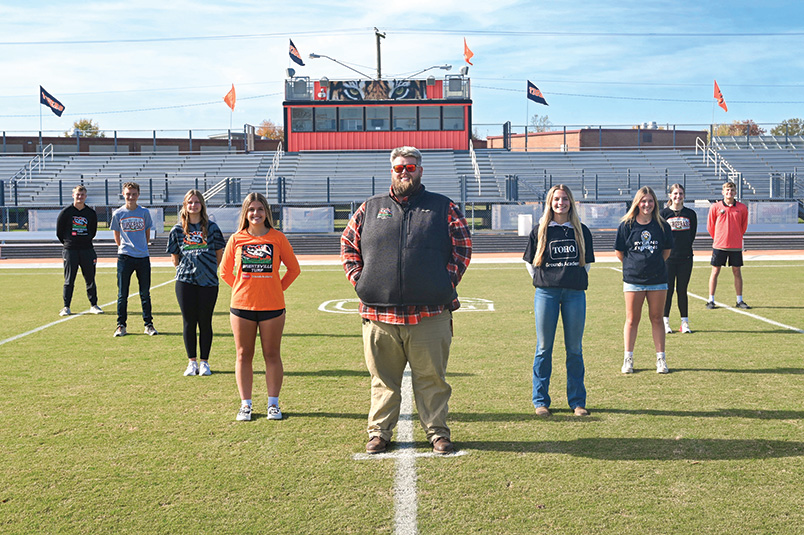
Students in the Brentsville turf program include (from left) Jeffery Cook, Logan Smallwood, Dakota Garber, Macie Mayes, instructor Drew Miller, Kat Lambert, Riley Cornnell, Sophie Jumbercotta and Aiden O’Neill. Photos courtesy of Drew Miller
Eight years ago, Brentsville District High School had no turf program.
The school in the northern Virginia town of Nokesville had just a small agriculture class with maybe 60 students that year to year generated minimal interest, says Katherine Meints, the school’s principal.
“It was a smaller program, primarily centered around work in a greenhouse. They had horticulture classes, and it was mostly plant based,” she says.
“We wanted to change the focus to something that would generate more interest” like turf grass and landscaping, Meints says. “We spent the better part of a year looking for someone who would fill the role that we were looking for.”
Enter Drew Miller, a 21-year-old member of the Pittsburgh Steelers grounds crew at the time who had also worked on the Pittsburgh Pirates grounds crew.
As Miller tells it, he was back home near Brentsville visiting his dad, who asked him to meet with a friend while he was in town. His dad’s friend was the director of career and technical education for the local school district and was looking to make some changes to the agriculture program.
“I thought I was just going to be giving suggestions on what they could do to develop their traditional ag program into more of a focus on jobs like landscaping, golf courses and sports fields,” Miller says.
Julie Kessler is set to graduate this month from Virginia Tech with a bachelor’s degree in agribusiness.
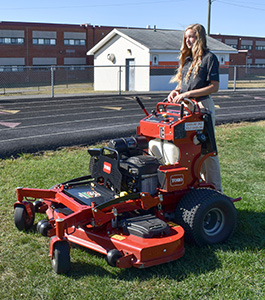
What he did not expect was to be asked to interview on the spot with Meints for a job leading the school’s reenvisioned ag program.
“I went in to talk with Dr. Meints, in a short-sleeved shirt with fertilizer stains and baggy pants, with hair down my back. I was not prepared at all — no résumé, no nothing,” Miller says.
Besides, he wasn’t really looking to become a teacher. “I’m from a family of educators, and I knew I did not want to be in a school,” he says. “I didn’t think I was capable of being a teacher.”
Even so, when the school offered Miller the job of taking over the ag program and turning it into what he envisioned it could be, he says he had to reconsider whether he could be a teacher after all.
“I thought, I’m going to kick myself if I don’t give it a chance. They’re asking me to build something from the ground up the way I see fit to be successful. And here we are, eight years later,” Miller says with a laugh.
New turf program draws student interest
Eight years and more than 1,000 students later, the turf program Miller leads has become something of a national model for generating student interest in turf.
Now, the program each year attracts more than 250 students, 20% of whom transfer from other schools in the division just for the ag program, Meints says.
“We’re the only ag program (in the school district), so kids can transfer from anywhere in the district. We even have some kids who transfer here to be in the program, and their parents pay tuition because they’re from another school system,” Meints says. “As the program grows, the students are going to have more and more opportunities to look at all aspects of related fields and get a good feel for the things they could do.”
One of those students is Bronco Deeds, who graduated in 2020 and credits Miller and the turf program with changing his life.
“Mr. Miller opened up the whole world of turf management to me,” Deeds says. “On his first day there, we were outside working on the field, putting paint down for a soccer game. After that first day, I was like ‘Oh, this is something I could do for the rest of my life.’”
Now, Deeds is an assistant superintendent at Potomac Shores Golf Club in Dumfries, Va., where he’s worked since 2022.
“I love it, working on the course,” says Deeds, a four-year GCSAA member who graduated from Virginia Tech with an associate degree in turf management. “Everybody always says that you want to find something to do that you enjoy getting up in the morning for. I really enjoy getting up and being out on the course every day. I like getting out of my comfort zone and getting experience on different types of equipment.”
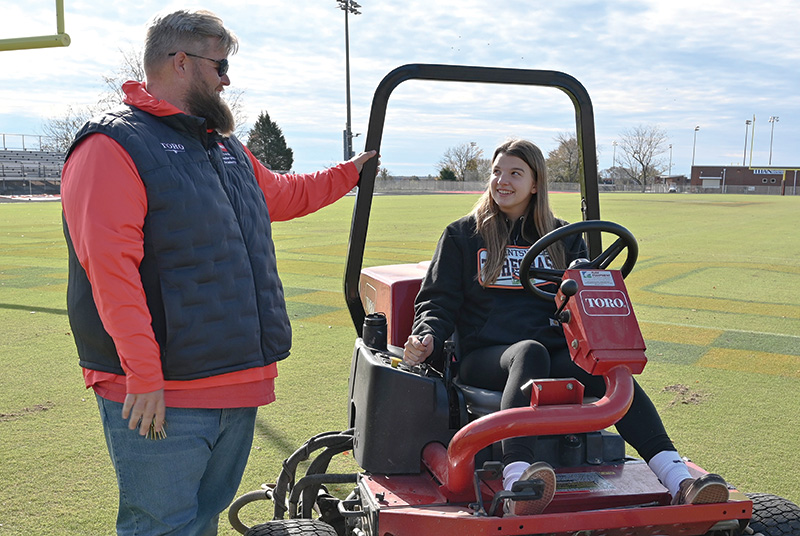
Drew Miller with student Elizabeth Mirko, who is planning to pursue a degree in marketing and hopes to work for a company in the industry.
Secret to the program’s success
Deeds thinks a big reason Miller and his turf program are so popular is how easy Miller is to connect with.
“Mr. Miller is easygoing and really easy to talk to. He connects with you more as a friend than as a teacher,” Deeds says. “And he sticks his neck out for you. His connections are insane. He knows everybody, and everybody knows him, and he’s always willing to help with a reference.”
Julie Kessler, a former turf program student who is set to graduate this month from Virginia Tech with a bachelor’s degree in agribusiness, agrees. “I wouldn’t even be here without Mr. Miller, honestly. I didn’t know this was even an avenue or a career opportunity until his class,” Kessler said.
After graduation, she hopes to work for an NFL team, but while she’s been in school, she worked for Blacksburg (Va.) Country Club.
“I wouldn’t be surprised if someday I end up back at a golf course,” she says. “The course I work at now is in the mountains, so the scenery throughout it is really pretty. It’s really nice to be out there, working outdoors.”
For his part, Miller thinks a big part of the turf program’s success is the trust and faith he places in the students. “The biggest thing I saw when I was starting off was that a lot of the kids didn’t have someone who had faith or trust in them,” Miller says.
One of the main ways Miller places trust in them, he says, is through operating commercial equipment — after passing a safety exam on each unit before using it, that is.
“We pride ourselves on having the students learn on the same commercial equipment that is used in the industry,” Miller says. “We have the same mower here at Brentsville that I used at (the Pirates’) PNC Park. We have the same paint machine here at Brentsville that I used at (the Steelers’) Heinz Field. So being able to have the students operate this equipment here at Brentsville is something that I think separates our program from the rest.”
Miller says sometimes the amount of trust he places in his students surprises those just learning about his turf program.
“I get a lot of people that act like, ‘You’re crazy, right? These are teenagers.’ No, they’re young adults,” Miller says. “Something I think we struggle with in education is that kids are looking for that person who will put trust in them and to give them the opportunity. We’ve created a space here where we do that — we put trust in them. And the administration is in full support of what we do. I never put kids in harm’s way. I’m able to judge where a kid is at and whether they’re ready.”
That said, Miller says dealing with the inevitable mistakes is part of the learning process.
“There are going to be mistakes. That’s life,” Miller says. “I had a student recently turn a little too close to a fence and pop a tire. It can be hard to overcome things like that, but it’s my job to make sure they have the confidence to get back on that piece of equipment.”
The hands-on experience with commercial-grade equipment makes his students prime candidates for internships, particularly at local golf courses.
“Something we really push in this program is to have our kids do an internship while they’re in high school. This is an industry where you have to love what you’re doing. And if you do an internship now, you can tell early on before you spend money on college,” Miller says. “I want to make sure they’re prepared for what they want to chase in life.”
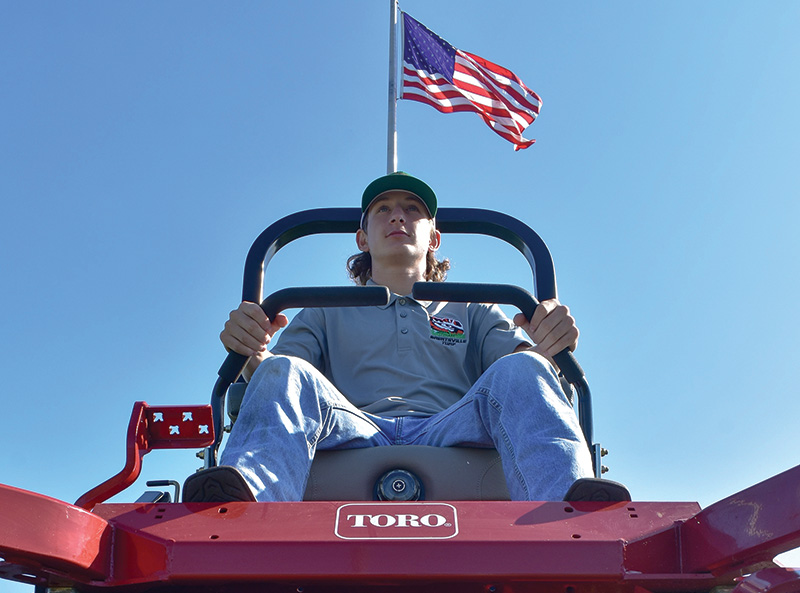
Bronco Deeds, who graduated in 2020, is an assistant superintendent at Potomac Shores Golf Club in Dumfries, Va., where he’s worked since 2022.
‘Big-vision guy’
Meints says Miller’s drive to create many and diverse experiences for the students is one of the turf program’s strengths. That includes field trips to Virginia Tech, golf courses, professional sports fields, botanical gardens and the like.
“He is a big-vision guy, which is great, because it’s led to a lot of really incredible things happening for the students in the program. He’s so motivated to create authentic and rich experiences for the kids, which is really at the heart of the program,” Meints says.
“During COVID, obviously we couldn’t take those field trips,” she says. “So Drew set up a podcast where he invites experts from around the nation to come in a talk to the kids via the podcast.”
Miller says the idea for the podcast came from a virtual tour his students joined via Zoom with Nicole Sherry, the head groundskeeper for the Baltimore Orioles.
“She gave us a virtual tour of Camden Yards — she walked us around the grounds space, the bullpen, the mound, all the different areas,” Miller says. “There were 200 students on a Zoom call for this field trip. We saw that kids were still excited and still something they are interested in. So we decided to do a weekly episode of a podcast, where we’d have different professionals on to talk to the kids.”
Miller says countless unexpected results have come from the “Tiger Turf Talk” podcast.
“We have created some of the best connections in the industry because of it. Our students are able to go and do incredible things because of those connections from the podcast,” he says.
Currently, 25 students from his program are in turfgrass programs in higher education, Millers says. Ten students have graduated college and are now in the industry, and at least 20 have gone directly from high school into a turf-related job. Another 40 current students have recently or are currently interning on a golf course. Miller says about 40% of his students — including those who go into turf careers — are female.
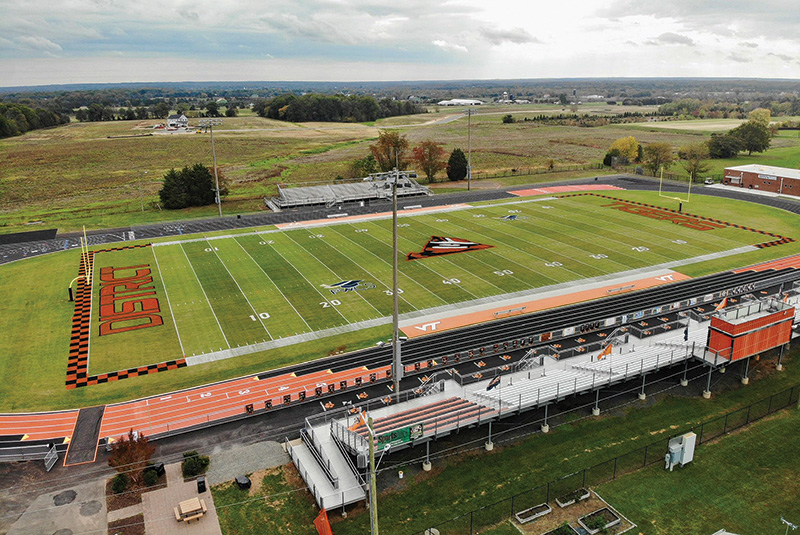
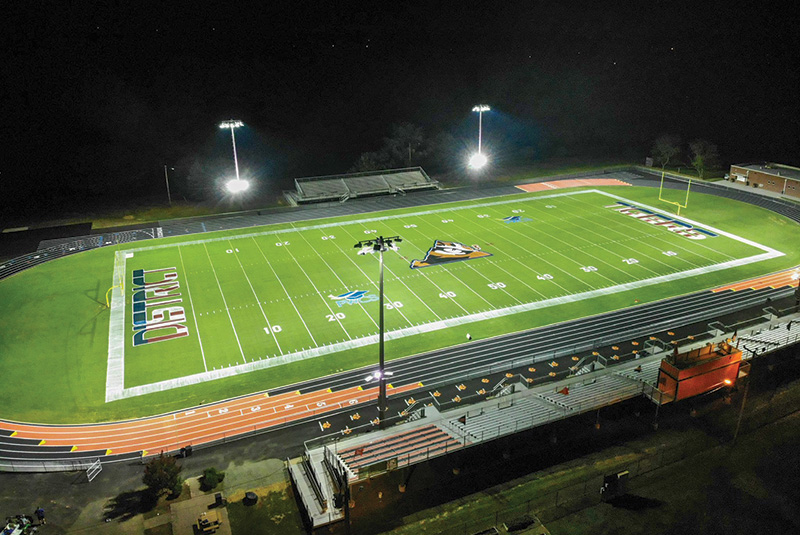
Brentsville District High School’s football field is quite a sight by day (top) and by night.
Corporate partnership, first of its kind
One of the most recent unexpected outcomes of the podcast was a formal partnership with The Toro Co. It all started three years ago, when — because of awareness of the Brentsville turf program stemming from the podcast — Toro representatives arranged to meet Miller and his students at the Sports Field Management Conference.
The resulting partnership is the first of its kind for Toro, says marketing manager, Josh Jans.
“When we met Drew and his students, we realized there’s a lot more to this guy and his students than this podcast. These were kids that are really getting a great foot forward into what their careers could look like,” Jans says. “So we started thinking through, ‘What can we do that’s going to be more impactful?’”
Miller says he was thrilled to be working with the company. “The partnership began by just figuring out how they can be more involved with us and how we can be more involved with them,” Miller says.
He says early on, that began with educators from the local Toro distributor coming to give students lessons in equipment maintenance. Toro also began donating equipment to fill program needs as well as to switch out old equipment with Toro equipment. Toro also began awarding two annual $2,500 scholarships to students at Brentsville pursuing college degrees in turf maintenance or engineering.
Brentsville rebranded the turf program with Toro’s name. “We decided the program could be synonymous with the Toro brand, and the way we do that is to rebrand our program the Brentsville Turf Toro Grounds Academy,” Miller says.
Outside the classroom, the hallway is decorated with the new name and photos of students using Toro equipment. “It’s a groundbreaking partnership. Through our program, Toro will have a direct impact on the future of the turfgrass industry,” he says.
On the horizon: A turfgrass research center
Ever on the march to expand the experiences available to his students, Miller says the next phase is to build a turfgrass research center at the school.
“Our superintendent and school board have been so impressed with our program that this last year they put in the capital improvement plan the funding for the first-ever high school turfgrass research center,” Miller says. Construction for the multi-million-dollar center is set to start the spring of 2025, he says, and is scheduled to be completed by the 2026 school year.
“The goal was to create a space where I can connect our students with college professors on a daily basis,” Miller says. “There’s going to be a lab space and a workshop space. We want a space where the students can be working with college professors and running trials.”
Miller says plans also include building a mechanics shop and a golf green outside the building. “Having the golf green here is going to be one of those things where they can explore another avenue in the industry here on-site,” he says. “Same with the mechanics shop — we will be teaching students hands-on who are prepping to be golf course mechanics. We’ll be trying to mimic the space in the industry.”
Miller says the new center can’t be built soon enough.
“I can’t wait,” he says. “This is something we’ve always dreamed of. It will do so much for the students and one of the program’s main goals of hands-on learning.”
Phil Cauthon (pcauthon@gcsaa.org) is GCM’s managing editor.